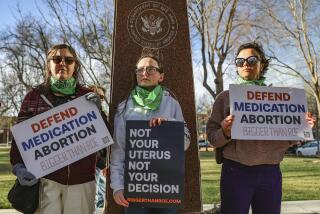Ruling Sends Stock Prices Soaring : Tobacco Firms Win Battle but Labeling War’s Still On
NEW YORK — Legal experts and plaintiffs in product liability suits against cigarette makers said Thursday that the tobacco companies have gained an important victory but not yet won the war with a new ruling by a federal appeals court in Philadelphia.
In an opinion that sent tobacco stocks heavenward, the U.S. 3rd Circuit Court of Appeals said 20-year-old federal rules that require warnings on cigarette packages protect the industry from claims that smokers are not adequately cautioned of the health hazards posed by cigarettes. The three-judge panel, ruling unanimously, also dismissed plaintiffs’ arguments that tobacco advertising has the effect of negating the printed warnings.
The opinion, handed down Wednesday, set off a stampede to the tobacco stocks, which have long been hobbled by fears of potentially huge product liability awards.
R. J. Reynolds Industries on Thursday rose $2.25 to $46.67 1/2, while Philip Morris gained $6.75 to $130.75, and American Brands climbed $4.37 1/2 to $85.12 1/2. Since the opinion was made public Wednesday, Reynolds stock has gained 13% in value, Philip Morris 14% and American Brands 12%.
Tobacco company attorneys quickly held a Manhattan press conference to predict that the opinion would set a national precedent and end a wave of product liability lawsuits that has grown now to about 90 pending legal actions from about 25 two years ago.
Other federal courts “will have to pay a great deal of respect” to the opinion, said Murray Bring, attorney for Philip Morris. Plaintiffs’ attorneys “must ask whether it’s now worthwhile to put in the time and resources . . . to go on the attack against the cigarette companies.”
Cigarette companies have often pointed out that they have not paid a cent in compensation nor lost a single judgment in 30 years of litigation claiming damage to health.
The latest opinion came in a case brought by the widow of a Little Ferry, N.J., man, Antonio Cipollone, who died at 58 from lung cancer allegedly caused by smoking. Rose Cipollone had sued cigarette makers Liggett Group, Philip Morris and others and had won in U.S. District Court in Newark, N.J.
The ruling will turn attention to similar cases that are soon scheduled to be heard by a lower court in Boston and by a federal appeals court in Tennessee.
“This ruling is broad and extremely beneficial to the tobacco companies, but it’s still just the holding of one appeals court,” said Gary T. Schwartz, a professor at UCLA Law School. “The logic here is not overwhelmingly obvious. . . . The matter could end up at the Supreme Court.”
A hearing has been scheduled for May 5 in Boston on the case of a widow who is suing Liggett & Meyers in the death of her husband, a disabled, 49-year-old veteran who died in August, 1980, of lung cancer allegedly caused by 23 years of smoking the company’s cigarettes. Also pending is the case of a Tennessee man who lost a leg because of peripheral vascular disease allegedly brought on by cigarette smoking. The plaintiff, Floyd Roysdon, lost his case in federal district court but has appealed.
Robert Potters, lawyer for widow Ann Palmer in the Boston case, acknowledged that the Philadelphia appeals court ruling struck “at the heart” of his case.
“In most of these cases, the issue of adequate warning was the one the plaintiffs relied on most heavily,” Potters said. “But there’s still no nationwide precedent, and if they take away that argument there are viable other theories.”
Plaintiff attorneys say they can also argue that the smokers were not adequately warned before the 1966 federal requirement was put into effect. They note that most who currently claim cigarette-caused ailments had begun smoking long before 1966.
They can also try to rely on state laws that make companies liable for injuries caused by products that are “unreasonably dangerous per se”--dangerous in their ordinary use--said Richard Daynard, a law professor at Northeastern University in Boston and an advocate for such product liability actions.
In rebuttal, the tobacco companies contend that continuous, vigorous public discussion of tobacco’s risks has given smokers adequate warning. “There was a high level of public awareness even in 1964,” said Bring, the attorney for Philip Morris.
He said plaintiffs who argue that they had been injured before 1966 would have to explain why they didn’t stop once the warnings appeared.
More to Read
Inside the business of entertainment
The Wide Shot brings you news, analysis and insights on everything from streaming wars to production — and what it all means for the future.
You may occasionally receive promotional content from the Los Angeles Times.











